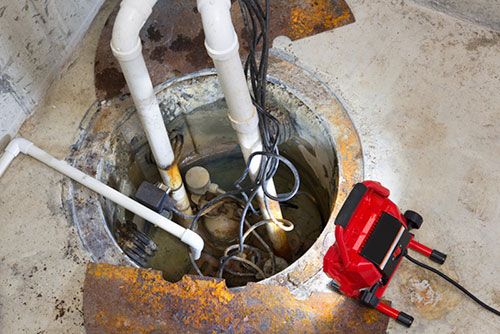 Are you worried about ground water infiltrating your home’s foundation after experiencing flooding in your basement? A sump pump provides important protection in preventing chronic water damage to your home. The concept is to keep the ground water from coming through the walls or cracks in the basement floor by redirecting it to the sump pit.
Are you worried about ground water infiltrating your home’s foundation after experiencing flooding in your basement? A sump pump provides important protection in preventing chronic water damage to your home. The concept is to keep the ground water from coming through the walls or cracks in the basement floor by redirecting it to the sump pit.
Sump pumps typically are installed in homes with basements. When the basement is built, drains are installed around the footers of the basement walls and are designed to collect any ground water. These are called perimeter drains.
The perimeter drains are piped into the sump pit, which is the “collection area” for the ground water. As water enters the sump basin in the basement, a sensor activates the sump pump. The pump pushes the ground water up and out of the pit and is discharged outside the home.
A sump pump may not be necessary in all homes. A house built on a slab, with no crawl space or basement, will not need a sump pump. Some homes with basements may not require them, either, if they are built on a lot where the water drains well and the ground water table is low. Depending on the water table, a home built on a crawl space may need a sump pit.
There are a wide variety of brands of sump pumps available. The typical sump pump for a residential application would be a 1/3-HP pump. Some homes that have lots of ground water may have 1/2-HP pumps, or even multiple pumps, to keep all the water pumped out of the house, especially during heavy rains.
Some people opt to purchase a battery backup pump system. These systems can range in cost from $400 to $2,000, based on pumping capacity, run time if the power is out, and other features such as cell phone alerts when the backup system is running.
A battery backup system includes an additional pump and battery that works when the primary pump fails – either due to power outage or the main pump failing mechanically. In either of these situations, having a backup system can protect you from a flooded basement and damage to your home and property.
It’s important to test your pump once in a while to make sure it will operate when you need it. In homes that have pumps that rarely run, it is even more important to test the pump every couple of months.
If you’re experiencing problems with your sump pump or are interested in installing a backup, feel free to contact us at (937) 837-2333.
